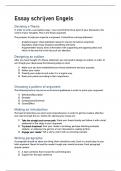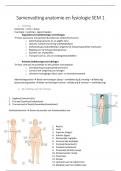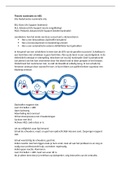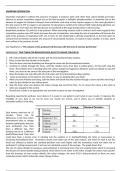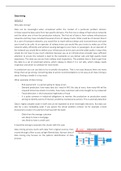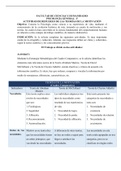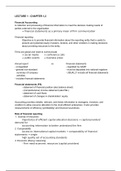MFP2601
SUPP EXAM
ANSWERS 2025
QUESTION 1: (10)
Study guide page 73
Protect Instructional Time
Make it school policy not to allow any activity to interfere with instructional time during the
formal school day. Examples include avoiding protests by educators and learners,
rescheduling departmental workshops to non-teaching hours, and ensuring extra-mural
activities are conducted outside of contact time.
Insist That Teachers Arrive on Time
Require teachers to arrive at school at least ten minutes before the school day starts. This
allows them to prepare for lessons and ensure the classroom environment is conducive to
teaching and learning.
Ensure Teachers Are in Class for the Full Duration of Every Lesson
Schedule staff and other meetings outside the formal school day. Teachers must account for
at least 1,800 hours of work each year. In a 200-day school year, spending a minimum of
seven hours per day at school accounts for 1,400 hours, leaving additional time for
preparation and professional activities.
Encourage Discussions About Teaching Quality
,Take the lead in addressing teaching quality during staff meetings and one-on-one
discussions with teachers. Make teaching quality a regular agenda item for meetings of staff,
subject/phase heads, and the School Management Team (SMT).
Establish a Notice Board for Teaching Quality
Dedicate an area in the staffroom for materials related to teaching quality, such as extracts
from The Teacher magazine and other educational publications.
Make Time for Staff Professional Development
Incorporate staff professional development into the school year plan. Establish a professional
development team to plan and organize activities focused on teaching quality. Ensure that
most professional development activities are directly related to improving teaching.
Promote Classroom Observation
Encourage non-evaluative classroom observation to allow teachers to learn from one another.
Principals, SMT members, and subject heads can invite teachers to observe their lessons.
Teachers should share their insights during staff meetings and professional development
workshops.
Provide Teachers with Professional Resources
Allocate funds in the school budget for purchasing professional resources, such as journals.
Take advantage of free teaching-related materials available online, like those on the Ednews
website.
Be Visible in Your School (Management by Walking About - MBWA)
Management by Walking About allows principals to observe teaching practices and identify
areas where teachers may need support. As a principal, being present in classrooms is
essential to understanding the quality of teaching.
Celebrate High-Quality Teaching
Regular classroom observations and discussions will highlight the school’s most talented and
effective teachers. Acknowledge their skills publicly and involve them in mentoring new or
beginner teachers.
Share Ideas and Learn from Others
Encourage teachers to connect with colleagues from other schools and observe their teaching
practices. This is particularly helpful for teachers who are the sole instructors of specific
subjects. Principals should also exchange ideas with their counterparts to improve teaching
quality.
, QUESTION 2: (10)
Page 12-14 STUDY GUIDE
Explain how the school management committees should execute their roles towards the
effective management of the Foundation Phase classes.
1. Support Academic Progress Track Learners’ Progress: Regularly monitor the development of literacy,
numeracy, and life skills to ensure effective implementation of the curriculum. Provide Learning
Resources: Allocate funds to equip Foundation Phase classrooms with suitable teaching aids like
storybooks, puzzles, and art supplies.
2. Ensure a Safe and Supportive Environment Health and Nutrition: Supervise nutrition programs that
offer healthy meals to boost learners' concentration and physical growth. Safety Policies: Establish and
enforce safety measures, including secure play areas, safe classroom designs, and emergency
protocols for young children.
3. Facilitate Teacher Development Training and Workshops: Arrange professional development
sessions for Foundation Phase teachers, emphasizing teaching methods like play-based learning and
early literacy strategies. Classroom Observation: Encourage non-evaluative classroom observations to
facilitate the sharing of best practices among educators.
4. Promote Parental Involvement Workshops for Parents: Provide guidance to parents on how to
support their children's education at home, including assistance with reading and homework. Regular
Communication: Keep parents updated on their child's progress and encourage their active
participation in school events.
5. Enhance Extracurricular Activities Organize Play and Extramural Activities: Create age-appropriate
activities that promote creativity, teamwork, and physical growth, such as sports days, arts and crafts,
and cultural celebrations. Inclusive Participation: Ensure that all learners have equal chances to
participate, regardless of their abilities.
6. Effective Record-Keeping Maintain organized records of attendance, performance, and health to
identify learning obstacles early and implement timely interventions. Ensure transparency in financial
management, particularly concerning resources allocated for Foundation Phase initiatives.
SUPP EXAM
ANSWERS 2025
QUESTION 1: (10)
Study guide page 73
Protect Instructional Time
Make it school policy not to allow any activity to interfere with instructional time during the
formal school day. Examples include avoiding protests by educators and learners,
rescheduling departmental workshops to non-teaching hours, and ensuring extra-mural
activities are conducted outside of contact time.
Insist That Teachers Arrive on Time
Require teachers to arrive at school at least ten minutes before the school day starts. This
allows them to prepare for lessons and ensure the classroom environment is conducive to
teaching and learning.
Ensure Teachers Are in Class for the Full Duration of Every Lesson
Schedule staff and other meetings outside the formal school day. Teachers must account for
at least 1,800 hours of work each year. In a 200-day school year, spending a minimum of
seven hours per day at school accounts for 1,400 hours, leaving additional time for
preparation and professional activities.
Encourage Discussions About Teaching Quality
,Take the lead in addressing teaching quality during staff meetings and one-on-one
discussions with teachers. Make teaching quality a regular agenda item for meetings of staff,
subject/phase heads, and the School Management Team (SMT).
Establish a Notice Board for Teaching Quality
Dedicate an area in the staffroom for materials related to teaching quality, such as extracts
from The Teacher magazine and other educational publications.
Make Time for Staff Professional Development
Incorporate staff professional development into the school year plan. Establish a professional
development team to plan and organize activities focused on teaching quality. Ensure that
most professional development activities are directly related to improving teaching.
Promote Classroom Observation
Encourage non-evaluative classroom observation to allow teachers to learn from one another.
Principals, SMT members, and subject heads can invite teachers to observe their lessons.
Teachers should share their insights during staff meetings and professional development
workshops.
Provide Teachers with Professional Resources
Allocate funds in the school budget for purchasing professional resources, such as journals.
Take advantage of free teaching-related materials available online, like those on the Ednews
website.
Be Visible in Your School (Management by Walking About - MBWA)
Management by Walking About allows principals to observe teaching practices and identify
areas where teachers may need support. As a principal, being present in classrooms is
essential to understanding the quality of teaching.
Celebrate High-Quality Teaching
Regular classroom observations and discussions will highlight the school’s most talented and
effective teachers. Acknowledge their skills publicly and involve them in mentoring new or
beginner teachers.
Share Ideas and Learn from Others
Encourage teachers to connect with colleagues from other schools and observe their teaching
practices. This is particularly helpful for teachers who are the sole instructors of specific
subjects. Principals should also exchange ideas with their counterparts to improve teaching
quality.
, QUESTION 2: (10)
Page 12-14 STUDY GUIDE
Explain how the school management committees should execute their roles towards the
effective management of the Foundation Phase classes.
1. Support Academic Progress Track Learners’ Progress: Regularly monitor the development of literacy,
numeracy, and life skills to ensure effective implementation of the curriculum. Provide Learning
Resources: Allocate funds to equip Foundation Phase classrooms with suitable teaching aids like
storybooks, puzzles, and art supplies.
2. Ensure a Safe and Supportive Environment Health and Nutrition: Supervise nutrition programs that
offer healthy meals to boost learners' concentration and physical growth. Safety Policies: Establish and
enforce safety measures, including secure play areas, safe classroom designs, and emergency
protocols for young children.
3. Facilitate Teacher Development Training and Workshops: Arrange professional development
sessions for Foundation Phase teachers, emphasizing teaching methods like play-based learning and
early literacy strategies. Classroom Observation: Encourage non-evaluative classroom observations to
facilitate the sharing of best practices among educators.
4. Promote Parental Involvement Workshops for Parents: Provide guidance to parents on how to
support their children's education at home, including assistance with reading and homework. Regular
Communication: Keep parents updated on their child's progress and encourage their active
participation in school events.
5. Enhance Extracurricular Activities Organize Play and Extramural Activities: Create age-appropriate
activities that promote creativity, teamwork, and physical growth, such as sports days, arts and crafts,
and cultural celebrations. Inclusive Participation: Ensure that all learners have equal chances to
participate, regardless of their abilities.
6. Effective Record-Keeping Maintain organized records of attendance, performance, and health to
identify learning obstacles early and implement timely interventions. Ensure transparency in financial
management, particularly concerning resources allocated for Foundation Phase initiatives.

